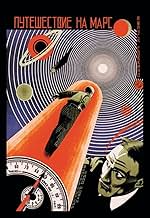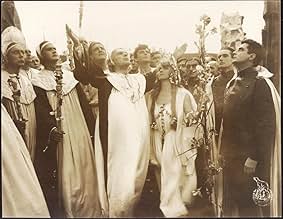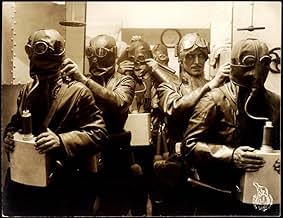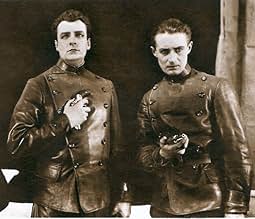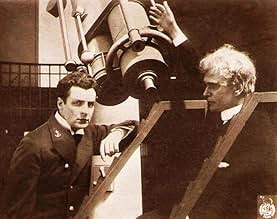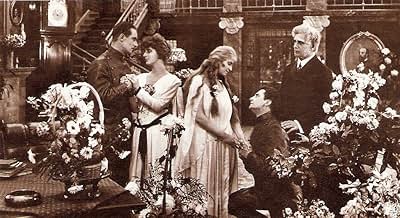अपनी भाषा में प्लॉट जोड़ेंA group of researchers from Earth travel in a spaceship to Mars, where, to big surprise, they find a peaceful vegetarian and pacifist civilization.A group of researchers from Earth travel in a spaceship to Mars, where, to big surprise, they find a peaceful vegetarian and pacifist civilization.A group of researchers from Earth travel in a spaceship to Mars, where, to big surprise, they find a peaceful vegetarian and pacifist civilization.
Nils Asther
- Wounded Martian Citizen
- (बिना क्रेडिट के)
Alfred Osmund
- Martian Priest
- (बिना क्रेडिट के)
फ़ीचर्ड समीक्षाएं
I know I've seen a fair portion of this film as part of a series on rare silent movies, which was shown on TV around 25 years ago. It was beautiful and fascinating, and I yearned to see more of it, although most published literature states that it is 'lost'.
As it is extremely unlikely that the film will ever see the light of day in its complete form, a spoiler warning is irrelevant, and the following is gleaned from published synopses more than from my personal recollection.
It is an early space opera, concerning a team of explorers who visit the planet Mars, and encounter a race of peace-loving vegetarians (is there any other kind? Oh, sit down, Adolph!). They return to Earth with the high priest's lovely daughter, and the plea for peace is threatened only by one villain who is dealt with by what can only be described as an Act of God.
Apart from George Melies' crazy moon explorer fantasies, this seems to be the first interplanetary adventure film in history, and from a country (Denmark) not noted for science-fiction films of any kind. Maybe they thought that they'd never do one better than this.
We might giggle at the idea that the spaceship had propellers on its wings, but come on...we are still accepting lots of logistically improbable and impossible concepts in films of today. I hope this film does still exist somewhere. The fragments I've seen, and the material I've read, makes me yearn to experience the whole of this 90-year-old space opera.
As it is extremely unlikely that the film will ever see the light of day in its complete form, a spoiler warning is irrelevant, and the following is gleaned from published synopses more than from my personal recollection.
It is an early space opera, concerning a team of explorers who visit the planet Mars, and encounter a race of peace-loving vegetarians (is there any other kind? Oh, sit down, Adolph!). They return to Earth with the high priest's lovely daughter, and the plea for peace is threatened only by one villain who is dealt with by what can only be described as an Act of God.
Apart from George Melies' crazy moon explorer fantasies, this seems to be the first interplanetary adventure film in history, and from a country (Denmark) not noted for science-fiction films of any kind. Maybe they thought that they'd never do one better than this.
We might giggle at the idea that the spaceship had propellers on its wings, but come on...we are still accepting lots of logistically improbable and impossible concepts in films of today. I hope this film does still exist somewhere. The fragments I've seen, and the material I've read, makes me yearn to experience the whole of this 90-year-old space opera.
Avanti Planeteros (Gunnar Tolnaes) is a soldier returned home after the war. His astronomer father (Nicolai Neiiendam) convinces him that the future is in the stars, so Avanti teams with Dr. Krafft (Alf Blutecher), who is betrothed to Avanti's sister Corona (Zanny Petersen), to build a spaceship capable of reaching Mars. They construct something that looks like a small, metal blimp with bi-plane wings, and along with a crew of about 8 other guys, they set off for Mars. Once there, they discover an idyllic paradise of robe-wearing, God-loving vegetarians. And of course a Martian woman (Lilly Jacobson) who immediately falls in love with Avanti. Also featuring Frederik Jacobsen as Professor Dubius.
This had to have been silly stuff even in 1918. After the end of WWI I'm sure that most Europeans were looking for a peaceful new way of life as far from war and misery as possible. The Martians aren't aliens as much as idealized humans, looking a bit like Ancient Greeks but with Egyptian ankhs on all of their clothing (Ancient Aliens?!?). The acting is hammy, the effects as primitive as one would imagine, and the story both juvenile and overlong. However, this is an important foundational step in the genre, which is why it's one of the 101 Sci-Fi Movies to See Before You Die.
This had to have been silly stuff even in 1918. After the end of WWI I'm sure that most Europeans were looking for a peaceful new way of life as far from war and misery as possible. The Martians aren't aliens as much as idealized humans, looking a bit like Ancient Greeks but with Egyptian ankhs on all of their clothing (Ancient Aliens?!?). The acting is hammy, the effects as primitive as one would imagine, and the story both juvenile and overlong. However, this is an important foundational step in the genre, which is why it's one of the 101 Sci-Fi Movies to See Before You Die.
I saw this film from 1918 recently at our local Helsinkian film archive. It seems that the Danish Film Institute has reconstructed it in 2006 to celebrate the 100th anniversary of Nordisk filmcompany, which was one of the largest in the world in the early 20th century. I believe there are several copies with English translations circulating around Europe at the moment.
I found the film fascinating and the trip to Mars well thought out. The plot line is certainly original, but I really don't want to reveal any more of it at the moment, as now the danger of spoiling things for you really exists ;-).
The film is also available on DVD, query the Danish Film Institute (Det Danske Filminstitut) web pages at dfi.dk with 'Himmelskibet' to get more info.
I found the film fascinating and the trip to Mars well thought out. The plot line is certainly original, but I really don't want to reveal any more of it at the moment, as now the danger of spoiling things for you really exists ;-).
The film is also available on DVD, query the Danish Film Institute (Det Danske Filminstitut) web pages at dfi.dk with 'Himmelskibet' to get more info.
The only time I've seen this rare Scandinavian foray into sci-fi territory mentioned anywhere - prior to its DVD availability courtesy of the Danish Film Institute - was in a literate appraisal of the genre by noted critic Philip Strick (who, incidentally, passed away recently). This alone would make it interesting and a film to seek out - but, alas, while undeniably good to look at (a traditionally Danish quality, I might add), dramatically it turned out to be a major disappointment!
Apart from being technically stilted and plagued by the exaggerated gestures of the actors (a well-established liability of most Silent-era product), it also presents a totally different view of Mars and its inhabitants to the one we've grown accustomed to seeing in later American films tinged by paranoia. Not only is there no concentrated effort to show an alternative landscape for the red planet, but the Martians themselves are merely benevolent humans fitted in Roman-era attire (with the addition of some outlandish accoutrements): apparently, they were once as 'barbaric' as us but have gradually attained enlightenment - and, though their language is different from that of their earthly visitors, they're somehow able to transmit their thoughts to them! In essence, it's clear that the film is infused with the last remnants of 19th century Romanticism (some of the title cards are unbelievably hokey) which Weimar Germany and, then, the Wall Street crash helped eradicate - leading to a change in the general attitude of cinema.
The ultimate intent of the picture, obviously, was a general plea for tolerance and understanding (WWI was still raging when the film emerged); however, while certainly watchable (and short enough at 81 minutes not to lapse into boredom), the almost total lack of tension between the inhabitants of the two planets - where, back home, it's represented by the ripe but highly amusing villainy of a Mephistophelean character who, eventually, gets his just desserts by way of a lightning bolt! - makes for an altogether dull narrative. Besides, virtually none of the occupants of the vessel - which itself constitutes nothing more fanciful than an airship - who have been assembled from all over the world (and are contemplating mutiny against their stoic captain when the journey takes longer than expected!) get to do much of anything once they land on Mars!!
Apart from being technically stilted and plagued by the exaggerated gestures of the actors (a well-established liability of most Silent-era product), it also presents a totally different view of Mars and its inhabitants to the one we've grown accustomed to seeing in later American films tinged by paranoia. Not only is there no concentrated effort to show an alternative landscape for the red planet, but the Martians themselves are merely benevolent humans fitted in Roman-era attire (with the addition of some outlandish accoutrements): apparently, they were once as 'barbaric' as us but have gradually attained enlightenment - and, though their language is different from that of their earthly visitors, they're somehow able to transmit their thoughts to them! In essence, it's clear that the film is infused with the last remnants of 19th century Romanticism (some of the title cards are unbelievably hokey) which Weimar Germany and, then, the Wall Street crash helped eradicate - leading to a change in the general attitude of cinema.
The ultimate intent of the picture, obviously, was a general plea for tolerance and understanding (WWI was still raging when the film emerged); however, while certainly watchable (and short enough at 81 minutes not to lapse into boredom), the almost total lack of tension between the inhabitants of the two planets - where, back home, it's represented by the ripe but highly amusing villainy of a Mephistophelean character who, eventually, gets his just desserts by way of a lightning bolt! - makes for an altogether dull narrative. Besides, virtually none of the occupants of the vessel - which itself constitutes nothing more fanciful than an airship - who have been assembled from all over the world (and are contemplating mutiny against their stoic captain when the journey takes longer than expected!) get to do much of anything once they land on Mars!!
The early first days of the last century were times of great human curiosity about new technologies and the marvellous possibilities in the world of science; startling discoveries and new inventions set the world on the path to modernity. Unfortunately, this time of enlightenment also coincided with terrible conflicts and war, mankind at its worst.
That human duality is very well reflected in the Danish film "Himmelskibet" (1918), directed by the great director Herr Holger-Madsen. It is a sci-fi film that includes a clear and sincere pacifist claim.
The film tells of the eagerness and hardships of the sea captain Herr Avanti Planetaros, now reconverted into a space captain, and his project of a trip to Mars. Before embarking on his particular space odyssey, Captain Planetaros will have to bear the incredulity and the scorn of many conservative astronomers, especially Professor Dubius ( ah, what a proper name ) . In spite of such indifference and after many troubles and years of work, the spaceship "Excelsior" is finally constructed and Captain Planetaro's trip to Mars goes from dream to reality. Once on Mars, Captain Planetaros and his crew finds an advanced society in which peace is a way of life among its citizens.
Filmed during the terrible years of WWI, "Himmelskibet" was obviously influenced by that devastating conflict that destroyed Europe during four miserable years. The message of peace and morality comes from the archaic but advanced Martian society which hopes to influence the Terrestrial civilization and wean it from such bad habits as violence, wine and canned meat.
So, Martians will show Terrestrials the way to achieve a better society on Earth with pacifist messages reminiscent of those of religion and pious morality, and in stark contrast to the bad behaviour on earth which has wrought so much unhappiness through the centuries. The Martians hope their philosophy will be spread on Earth once Planetaros and his crew returns home.
In these modern times in which the movies are full of technological magic, the special effects in "Himmelskibet" are primitive by comparison but are still full of naive charm. In fairness, longhaired and modernen youngsters should remember that Herr Holger-Madsen was also a very modernen youngster in those olden times, a director who was innovative, imaginative and influential.
It must be said too that this Herr Graf thought that instead of journeying through space to Mars, Captain Planetaros may have travelled back in time to ancient Greece since the Martian citizens wear white and classical robes so reminiscent of the Hellene imaginarium ( Martians may look like Greeks but in comparison they are crashing bores ). However, in spite of its naive ways, the film effectively conveys its important message and one that is no less valid today where mankind still dreams of a world of peace and cooperation. Alas, even after Captain Planetaros' trip to Mars, the world seems not to have grown in wisdom.
And now, if you'll allow me, I must temporarily take my leave because this German Count must make love to one of his Teutonic heiress and war with the other one.
That human duality is very well reflected in the Danish film "Himmelskibet" (1918), directed by the great director Herr Holger-Madsen. It is a sci-fi film that includes a clear and sincere pacifist claim.
The film tells of the eagerness and hardships of the sea captain Herr Avanti Planetaros, now reconverted into a space captain, and his project of a trip to Mars. Before embarking on his particular space odyssey, Captain Planetaros will have to bear the incredulity and the scorn of many conservative astronomers, especially Professor Dubius ( ah, what a proper name ) . In spite of such indifference and after many troubles and years of work, the spaceship "Excelsior" is finally constructed and Captain Planetaro's trip to Mars goes from dream to reality. Once on Mars, Captain Planetaros and his crew finds an advanced society in which peace is a way of life among its citizens.
Filmed during the terrible years of WWI, "Himmelskibet" was obviously influenced by that devastating conflict that destroyed Europe during four miserable years. The message of peace and morality comes from the archaic but advanced Martian society which hopes to influence the Terrestrial civilization and wean it from such bad habits as violence, wine and canned meat.
So, Martians will show Terrestrials the way to achieve a better society on Earth with pacifist messages reminiscent of those of religion and pious morality, and in stark contrast to the bad behaviour on earth which has wrought so much unhappiness through the centuries. The Martians hope their philosophy will be spread on Earth once Planetaros and his crew returns home.
In these modern times in which the movies are full of technological magic, the special effects in "Himmelskibet" are primitive by comparison but are still full of naive charm. In fairness, longhaired and modernen youngsters should remember that Herr Holger-Madsen was also a very modernen youngster in those olden times, a director who was innovative, imaginative and influential.
It must be said too that this Herr Graf thought that instead of journeying through space to Mars, Captain Planetaros may have travelled back in time to ancient Greece since the Martian citizens wear white and classical robes so reminiscent of the Hellene imaginarium ( Martians may look like Greeks but in comparison they are crashing bores ). However, in spite of its naive ways, the film effectively conveys its important message and one that is no less valid today where mankind still dreams of a world of peace and cooperation. Alas, even after Captain Planetaros' trip to Mars, the world seems not to have grown in wisdom.
And now, if you'll allow me, I must temporarily take my leave because this German Count must make love to one of his Teutonic heiress and war with the other one.
क्या आपको पता है
- ट्रिवियाReported by the British press in 1919 to have cost £20,000. After inflation this would be approaching £1.5 million in 2024.
- भाव
Avanti Planetaros - Captain of the Space Ship: Glowing and calling planets... I am coming!
- कनेक्शनEdited into Eventyret om dansk film 3: Danske filmstjerner og kometer - 1913-1923 (1996)
टॉप पसंद
रेटिंग देने के लिए साइन-इन करें और वैयक्तिकृत सुझावों के लिए वॉचलिस्ट करें
विवरण
- रिलीज़ की तारीख़
- कंट्री ऑफ़ ओरिजिन
- आधिकारिक साइट
- भाषा
- इस रूप में भी जाना जाता है
- A Trip to Mars
- उत्पादन कंपनी
- IMDbPro पर और कंपनी क्रेडिट देखें
- चलने की अवधि1 घंटा 37 मिनट
- रंग
- ध्वनि मिश्रण
- पक्ष अनुपात
- 1.33 : 1
इस पेज में योगदान दें
किसी बदलाव का सुझाव दें या अनुपलब्ध कॉन्टेंट जोड़ें

